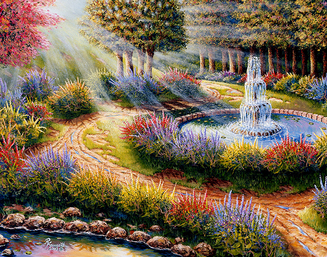I used to want everything –
poetry, bliss, insights
each time I sat in meditation.
Now I want silence,
the quiet to grow answers
from seeds of intention
planted long ago.
I’ll wait for the garden of peace,
for as long as it takes
to find Eden once again.
After eight years of meditation practice, I’m still humbled by the amount of striving I notice while sitting. Maybe I can heal a troubled relationship in this sit, get rid of an ache or pain, or plan out the whole week while I’m consciously breathing. After all, my mind is most alert when I sit in the morning. It’s a blank page, just waiting to be filled with poetic possibilities, bliss, and insights that will help me figure it all out. I won’t ever have to worry again, because the garden of peace is a onetime destination, right?
Wrong! If you’ve ever tried to force a poem or painting into being, wished someone would comply with your demands, or shouted at a plant to grow a certain way, you’ll know the disappointment that accompanies these futile endeavors. Though you may think you’ve finished the job, you’ll notice a physical contraction in your body, maybe even some fatigue. The poem or painting may sound or look odd; you might strain your relationship with someone; your beloved plant may wilt and die.
I’m currently contemplating a career change. In addition to patient care, I want to offer meditation and writing classes for patients. What will this look like? Will it be a shared medical appointment, or will it fall under the umbrella of patient education? Will insurances even pay for a shared medical appointment for stress if there is no medical component addressed? Will I be able to lead a meditation and writing class alongside an MBSR class already offered to our patients?
I find myself anxiously calling other physicians who lead shared medical appointments, bombarding them with questions while the voice of doubt is reverberating through my head and heart. “Kaveri, who do you think you are doing anything other than Family Medicine. It’s bad enough you’re never home caring for those who need you!” I recognize this critical voice as a woman I playfully call Gangaben, an Indian woman who wears a tight bun and an apron. Unlike me, she perpetually lives in the kitchen always cooking for her family.
For a few days, my meditation practice is filled with future worry, thinking, planning, and strategizing. The questions swirl in my head like cyclones that will not rest till I have concrete answers. My physical body is quite tense – neck, shoulders, forearms and gut all constricted like a garden hose with several kinks, just waiting for the flow of breath to alleviate the muscular tension.
I physically and intuitively sense that I need to slow down and let go of something. But the questions still persist. If I take my hands off the steering wheel now, what will happen? Will I be doomed to a life of unfulfilled dreams? I make space for Komal, the voice of my inner mentor, a woman with black and silver hair dressed in long flowy clothing with dangling abalone and silver earrings. Her voice is gentle, yet confident. “Kaveri, you are already living your dreams. You are publishing poetry, writing essays, and offering mindfulness, compassion, and kindness to others whenever the opportunity arises. You will continue to teach a meditation and writing class, at work or elsewhere. It is your destiny.”
In the next few meditation sits, I try to let go of everything – the questions, possible answers, even my identity as a person trying to get somewhere and accomplish something. I noticed my muscles melting into the river of mindful awareness. The flow of breath, poetic possibilities, bliss, and insights are unimpeded by fear. I remember the intention of a vocalist I met at a women’s yoga and singing daylong, “It’s so easy.” Maybe it is easy with less striving and more surrender.
I don’t know if my next meditation and writing class will be a shared medical appointment, offered in patient education, or somewhere else entirely. The details don’t really matter. I connect with my seeds of intention for this class planted long ago. In the words of poet Galway Kinnel, I want
“to reteach a thing its loveliness,
to put a hand on its brow
of the flower
and retell it in words and in touch
it is lovely
until it flowers again from within, of self-blessing”
*****
This story is still unfinished. Maybe the garden of peace is not a destination, but a metaphor for every spiritual journey. In the quite space of meditation, we grow answers from seeds of intention planted long ago. We’ll forget about the concepts of allowing and divine timing, and strive for a particular outcome. After the tension builds to a certain breakpoint, we’ll wait for the garden of peace, for as long as it takes to find Eden once again. We’ll remember the seasons, Mother Nature’s rhythms, and our belonging to a paradise where everything unfolds naturally, where patience produces trust.

 RSS Feed
RSS Feed